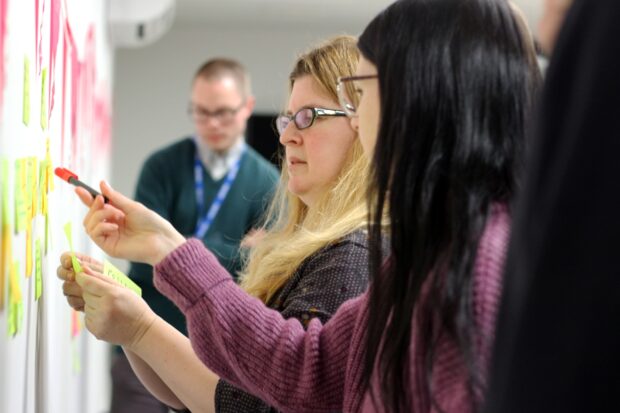
Policymakers want to supplement their existing methods of gaining insight with quicker ways to test ideas.
Traditional feedback methods such as consultations and programme evaluations can take a long time to produce, whereas user-centred design methods can quickly provide insight into how people might react or interact with either a policy idea or service.
I set up the new schools technology user-centred design (UCD) policy lab within the Department for Education that brings user-centred design and policy decision making together.
Relationships have flourished
The team and I have tried different ways of working and tested new approaches, such as co-design, speculative design, and concept testing.
Relationships between policy and digital colleagues have flourished during this time. The researchers and designers on the team have developed their understanding about political and ministerial pressures. Policy advisors are learning about user centred design - including defining and understanding the problem space before moving to solution ideation.
We’ve had some positive feedback from policy colleagues:
"I would be worried going into the next year without policy lab" [Annie Maciver, Schools Technology Policy lead]
"Being on the policy lab team provided me with a great opportunity to learn more on digital delivery and agile methods" [Cath Farrugia, Senior Policy Advisor]
The lab model creates new challenges
There are a few things that are different from the practices of a traditional digital delivery team. The projects we work on are quite short, and so there’s lots of context switching. Within the area of digital strategy and schools' use of technology, we have covered lots of different topics, and spoken to different users within schools. Between May and July 2023, we spoke to senior school leaders, 6th form students, and assistive technology leads in special schools.
How I prioritise and plan work into the team’s schedule has been a learning curve. Policy leads make suggestions on what problem area they would like the team to work on based on upcoming priorities. I then have lots of conversations to get us to a clear problem statement that the team can work on within the time we have. The team and I have done lots to support these conversations and developed various methods that help us get to a clear problem statement. More time to plan an approach for the project is always beneficial.
Linked to that is how fast paced the work has been. We have been able to produce outputs within a 4-week period, but this isn't ideal for team health and longer-term productivity. I built in some mitigations to try and address this. Another researcher joined the team, and I planned breaks between projects. I focus more on strategic backlog refinement and prioritisation with policy colleagues so that the team can focus on one project at a time.
As the team and I have worked on various projects, I iterated how we scoped projects to ensure that the work we produce leads to concrete next steps with clear owners and dates. For a project looking into assistive technology in special schools, we worked with the policy lead to support her work to develop guidance and training to the sector. It was great to see her take our insights and turn these into actions.
Spreading this way of working around government
I’ve loved building the UCD policy lab team. We have worked on prioritised problem areas, and we have been able to respond to ministerial requests, such as the maths to 18 policy area. Through our project outputs, we have showed that this is a model worth investing in.
I am focussed now on how to scale up our existing offer to be able to support more policy areas across the portfolio. We will need to manage a backlog across more than one area, but this will enable us to deliver more joined-up work and get more value from UCD approaches.
I’ve also been advising colleagues across the department on how they might set up their own UCD lab embedded in their local policy areas. I want to talk to others who lead similar teams to learn from them. Let's connect if you're interested.
By producing service design artefacts and user insights to relevant policy areas, we are exposing our methods to an increasing number of policy colleagues. This helps us move toward a future where UCD techniques are embraced department wide - including operational delivery colleagues, policy makers, and Ministers.
Join our community
We use this blog to talk about the work of the multidisciplinary policy design community. We share stories about our work, the thinking behind it and what policymaking might look like in the future. If you would like to read more, then please subscribe to this blog. If you work for the UK's government, then you can you join the policy design community. If you don't work for the UK government, then join our AHRC Design and Policy Network.